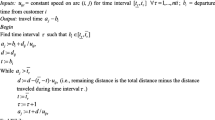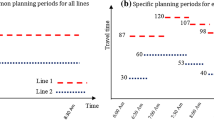Abstract
Sequential planning of public transportation services can lead to inefficient vehicle schedules. Integrating timetabling and vehicle scheduling, the vehicle scheduling problem with time windows (VSP-TW) aims at minimizing costs of public transport operations by allowing small shifts of service trips’ departure times. Within the scope of tactical planning, a larger flexibility of departure times following predefined departure time windows may be desirable. However, with increasing degrees of freedom, conventional solution approaches for the VSP-TW become computationally prohibitive. Furthermore, a sole focus on cost minimization might produce timetables of insufficient quality, while public transport agencies expect high-quality timetables with service trips scheduled at times reasonable from a passenger’s point of view. Extending the VSP-TW, we propose the vehicle scheduling problem with time windows and balanced departure times (VSP-TW-BT). In addition to the cost-efficiency objective of the VSP-TW, our objective function considers the quality of a timetable from a passenger’s point of view. Timetables are generated by balancing consecutive departures on a line according to predefined departure time intervals. We use a weighted sum approach to combine both objectives, namely costs of operation and quality of timetables. Our mathematical model and solution approach are based on efficient techniques known from the area of vehicle routing with time windows. A hybrid metaheuristic framework is proposed, which decomposes the problem into a scheduling and a balancing component. Real-world-inspired instances allow for the evaluation of quality and performance of the solution approach. The proposed solution approach is able to outperform a commercial solver in terms of run time and solution quality.






Similar content being viewed by others
Notes
By default, CPLEX uses tactics to find a proven optimal solution quickly. In this case, however, the model is sufficiently difficult and a proof of optimality was impossible to achieve within the given run time limit of 10 h. Hence, by changing the parameter MIPEmphasis, we put greater emphasis on feasibility (and less emphasis on analysis and proof of optimality).
References
Blum C, Blesa Aguilera MJ, Roli A, Sampels M (eds) (2008) Hybrid metaheuristics. An emerging approach to optimization, studies in computational intelligence, vol 114. Springer, Berlin. doi:10.1007/978-3-540-78295-7
Bräysy O, Gendreau M (2005) Vehicle routing problem with time windows, part II: metaheuristics. Transp Sci 39:119–139
Bunte S (2009) Lösungen für Anwendungsfälle der Fahrzeugeinsatzplanung im öffentlichen Personennahverkehr. PhD Thesis. Universität Paderborn
Bunte S, Kliewer N (2009) An overview on vehicle scheduling models. Public Transp 1:299–317
Cacchiani V, Toth P (2012) Nominal and robust train timetabling problems. Eur J Oper Res 219(3):727–737
Ceder A, Wilson N (1986) Bus network design. Transp Res Part B 20:331–344
Desaulniers G, Hickman MD (2007) Public transit. In: Barnhart C, Laporte G (eds) Handbooks in operations research and management science: transportation, vol 14. Elsevier, pp 69–127
Desrochers M, Soumis F (1989) A column generation approach to the urban transit crew scheduling problem. Transp Sci 23:1–13
Doerner K, Schmid V (2010) Survey: matheuristics for rich vehicle routing problems. In: Blesa M, Blum C, Raidl G, Roli A, Sampels M (eds) Hybrid metaheuristics, vol 6373. Lecture notes in computer science. Springer, Berlin Heidelberg, pp 206–221
Forbes MA, Holt JN, Watts AM (1994) An exact algorithm for multiple depot bus scheduling. Eur J Oper Res 72(1):115–124
Kliewer N, Amberg B, Amberg B (2012) Multiple depot vehicle and crew scheduling with time windows. Public Transp 3:213–244
Kliewer N, Mellouli T, Suhl L (2006) A time–space network based exact optimization model for multiple-depot bus scheduling. Eur J Oper Res 3(175):1616–1627
Leithäuser N (2012) Algorithms and complexity of timetable synchronization and vehicle scheduling problems in an integrated approach. Verlag Dr. Hut, Munich
Liebchen C (2006) Periodic timetable optimization in public transport. PhD Thesis. Technische Universität Berlin
Liebchen C, Möhring R (2007) The modeling power of the periodic event scheduling problem: railway timetables—and beyond. Algorithmic methods for railway optimization, vol 4359. Lecture notes on computer science. Springer, Berlin, pp 3–40
Liebchen C, Schachtebeck M, Schöbel A, Stiller S, Prigge A (2010) Computing delay resistant railway timetables. Comput Oper Res 37(5):857–868
Loebel A (1999) Solving large-scale multiple-depot vehicle scheduling problems. In: Lecture notes in economics and mathematical systems (LNEMS). Computer-aided transit scheduling, vol. 471. Springer, pp 69–127
Michaelis M, Schöbel A (2009) Integrating line planning, timetabling, and vehicle scheduling. Public Transp 1:211–232
Parragh SN, Schmid V (2013) Hybrid column generation and large neighborhood search for the dial-a-ride problem. Comput Oper Res 40(1):490–497
Pisinger D, Ropke S (2010) Large neighborhood search. In: Gendreau M, Potvin JY (eds) Handbook of metaheuristics. Springer, pp 399–419
Puchinger J, Raidl GR (2005) Combining metaheuristics and exact algorithms in combinatorial optimization: a survey and classification. In: Mira J, Álvarez JR (eds) Artificial intelligence and knowledge engineering applications: a bioinspired approach, vol 3562. Lecture notes in computer science. Springer, Berlin Heidelberg, pp 41–53
Raidl G, Puchinger J, Blum C (2010) Metaheuristic hybrids. In: Gendreau M, Potvin JY (eds) Handbook of metaheuristics, 2nd edn, vol 146. Springer, pp 469–496. doi:10.1007/978-1-4419-1665-5_16
Reinboth M, Breme B (2014) Gestaltung des SPNV-Angebots auf der Südharzstrecke und Süd-Westharzstrecke von 2015 bis 2029. http://www.suedharzstrecke.de/downloads/Tagungsband%20%C3%96PNV%20Veranstaltung%20Herzberg%2021.02.2014.pdf
Ribeiro C, Soumis F (1994) A column generation approach to the multiple-depot vehicle scheduling problem. Oper Res 42(1):41–52
Ropke S, Pisinger D (2006) An adaptive large neighborhood search heuristic for the pickup and delivery problem with time windows. Transp Sci 40:455–472
Savelsbergh M (1992) The vehicle routing problem with time windows: minimizing route duration. INFORMS J Comput 4:146–154
Schmid V (2014) Hybrid large neighborhood search for the bus rapid transit route design problem. Eur J Oper Res 238(2):427–437
Schmid V, Doerner K (2013) Examination and operating room scheduling including optimization of intra-hospital routing. Transp Sci 48(1):59–77
Schrimpf G, Schneider J, Stamm-Wilbrandt H, Dueck G (2000) Record breaking optimization results using the ruin and recreate principle. J Comput Phys 159(2):139–171
Verkehrsverbund-Südniedersachsen (2014) Timetables for lines 120, 154, 180, 185, 220. http://www.vsninfo.de/de/fahrplaene-ab-15122013/ueberland
Vidal T, Crainic TG, Gendreau M, Prins C (2014) A unified solution framework for multi-attribute vehicle routing problems. Eur J Oper Res 234(3):658–673
Author information
Authors and Affiliations
Corresponding author
Rights and permissions
About this article
Cite this article
Schmid, V., Ehmke, J.F. Integrated timetabling and vehicle scheduling with balanced departure times. OR Spectrum 37, 903–928 (2015). https://doi.org/10.1007/s00291-015-0398-7
Received:
Accepted:
Published:
Issue Date:
DOI: https://doi.org/10.1007/s00291-015-0398-7




